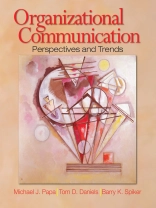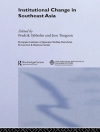Communication in organizations has changed drastically since the release of the first edition of this bestselling textbook. This fully revised and updated edition delves into state-of-the-art studies, providing fresh insights into the challenges that organizations face today. Yet this foundational resource remains a cornerstone in the examination of classic research and theory in organization communication.
Beginning with an extended analysis – from an organizational communication vantage point – of the Hurricane Katrina disaster, this groundbreaking edition weaves recent and memorable case materials with up-to-date research and theory, creating a meaningful and comprehensive view of organizational communication.
The authors take the unique path of describing and evaluating communication in organizations by focusing on three major perspectives for understanding organizations: traditional, interpretive, and critical. Because these perspectives differ in the ways that they study communication and in the assumptions that they make about the nature of organizations, the authors are able to offer diverse insights into communication in organizations. These three perspectives are used to examine communication functions and structure, organizational culture, information technology; cultural control, diversity, and change; new forms of organizing such as lattices and heterarchies, group relations, leader-member relations, power, conflict, and strategic communication; and new millennium thinking about organizations.
Packed with current case studies and commentary,
Organizational Communication features an impressive range of contemporary global institutions such as General Motors, Triyo Industries of Japan, Enron, Wal-Mart, Ben & Jerry′s, The Carter Center′s Peace Programs, Canada′s public health programs, social change programs in rural India, and more.
Important new topics in this edition include
- New Communication Structures
- Cultural Diversity and Empowerment
- Implications of Information Technology
- Affirmative Action and Supreme Court Cases
- Transformational Leadership
- New Millennium Trends
Instructor′s Resource CD Available
An easy-to-follow instructor′s manual on CD is available for qualified textbook adopters. This valuable instrument includes Power Point presentations, keyword definitions, discussion and exam questions, suggested activities, sample syllabi, recommended assignments, hyperlinks to complementary Internet video, and more.
قائمة المحتويات
Preface
Prologue
1. An Orientation to Organizational Communication
Organization and Communication
Perspectives on Organizational Communication
2. Communication and Its Functions
A Precaution: Function and Structure Relationship
Communication, Information, and Meaning
Functions of Communication
3. Organizational Communication Structure
Traditional Approach to Structure
Formal Communication
Informal Communication
Communication Structure as a Network
Interpretive Approaches to Communication Structure
Critical Approaches to Communication Structure
4. Organization Theory: Prescriptions for Control
Scientific and Classical Management
Transitional Theories
The Human Relations Movement
Human Resource Development
5. Organization Theory: Metaphors of Biology
System Theory
Weick′s Theory of Organizing
Luhmann′s Social Systems Theory
Evolutionary Psychology
6. Organizational Theory: Communication and Culture
Communication and Culture: A Way to Understand Organizations
Approaches to Understanding Organizational Culture
Describing Organizational Culture: The Case of Ben & Jerry′s
7. Information Technology
Information Technology and Change
Traditional Perspective
Interpretive Perspective
Critical Perspective
8. Cultural Control, Diversity, and Change
Cultural Control
Organizational Culture and Diversity
Traditional Perspectives on Cultural Control, Diversity, and Change
Interpretive Perspectives on Cultural Control, Diversity, and Change
Critical Perspectives on Cultural Control, Diversity, and Change
The Ethics of Diversity
9. Group Relationships
Traditional Perspective on Group Relationships
Interpretive Perspective on Group Relationships
Critical Perspective on Group Relationships
10. Leader-Member Relationships
Limitations of Leadership Theory and Research
Traditional Perspective
Interpretive Perspective
Critical Perspective
11. Power
Traditional Views of Status and Power
Interpretive Perspectives on Power
Power in the View of Critical Theory
Power and Conflict: Connected and Separate Phenomena
12. Conflict
Traditional Perspectives on Conflict
Interpretive Perspectives on Conflict
Critical Perspectives on Conflict
Ethics in Conflict
13. Strategic Communication
Characteristics of Strategic Communication
The Traditional Perspective
The Interpretive Perspective
The Critical Perspective
14. New Millennium Thought: Perspectives and Trends
Perspectives on the New Millennium
Traditional Perspectives and the New Millennium
Interpretive Perspectives and the New Millennium
Critical Perspectives and the New Millennium
Trends Influencing Organizations Today
عن المؤلف
Barry Spiker has nearly 25 years of experience in leading organizational change and human capital development and management. Formerly a Practice Leader and Executive at Andersen Consulting (now, Accenture), Dr Spiker was part of a team that led the design and implementation of the enterprise’s Organisational Change, HR and Communications practices. Similarly, Dr Spiker served as Managing Director at Price Waterhouse (now ‘PWC’), assisting in the inception of the firm’s Change Integration practice. As Vice President of the TQM practice at Mercer Management Consulting, he was one of the developers of six-sigma consulting and reengineering work that accounted for nearly US$40 million in revenues. At Honeywell, Dr Spiker spent six years as an international OD and HR manager/executive consultant across multiple global business units. Dr Spiker compounds his management experience with significant consulting practice. He has developed communication strategies for several start-ups and was recently involved in the design and implementation of an integrated CRM methodology for a global trading concern and the development of an e-Transformation framework for integrating web and human capital strategies for a publicly traded e Commerce company. Among other subjects, Dr Spiker developed and/or taught courses in Consulting, Culture Change & Development, Organizational Communication, and Quantitative/Qualitative Research at the University of New Mexico, where he also served as Founding Director of the school’s Institute for Organizational Research. For three years, he served as the Markley Professor of Management at Miami University teaching MBAs who awarded him twice as their graduating commencement speaker. Most recently, he served as a Senior Research Fellow at the University of Indianapolis where he completed a year-long study of mature professional workers contributory value across multiple industries. Dr. Spiker earned a Ph D with emphases in Organization Communication from Ohio University. He holds a Masters degree in International Relations and a Bachelors degree (summa cum laude) in Economics/Political Science, also from Ohio University. Dr. Spiker currently is President of Better Board Governance (www.betterboardgovernance.com), he is co-founder of Million Ready Minds (www.millionreadyminds.org), a non-profit dedicated to finding the best global talent to work on projects focused on sustainability. He also is the Acting Director of Arizona State University’s Consortium for Global Workforce Strategies. He is a member of the Phoenix Committee on Foreign Relations, involved with the Governor’s Commission on Mature workers, loves to play golf, read history and lives with his wife Janice, an executive recruiter, and their four cats in the Sonoran desert outside of Phoenix, Arizona. He recently coauthored a new edition of his book with Michael Papa and Tom Daniels, entitled “Organizational Communication: Perspectives and Trends” (Sage publishers).












